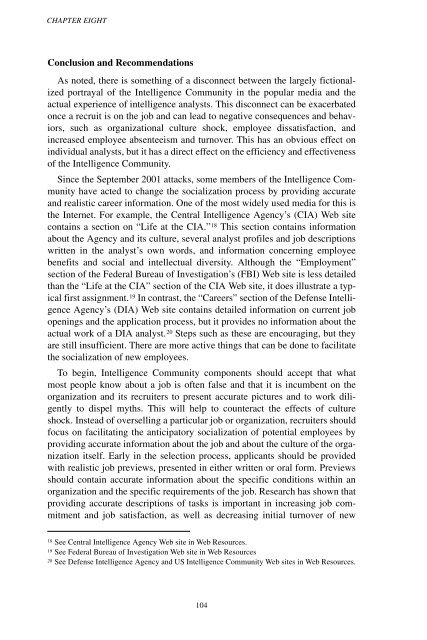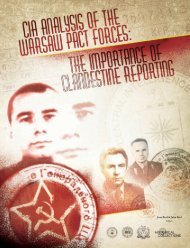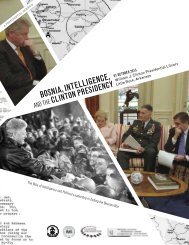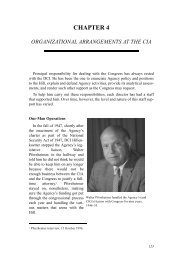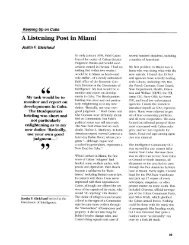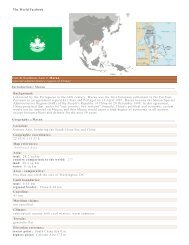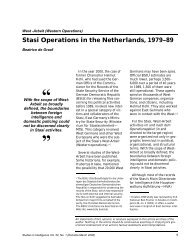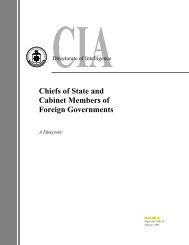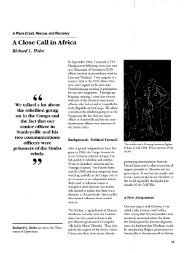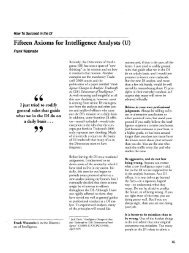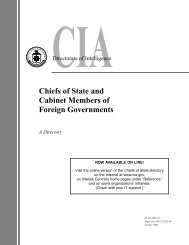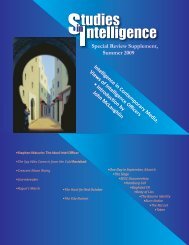Analytic Culture in the U.S. Intelligence Community (PDF) - CIA
Analytic Culture in the U.S. Intelligence Community (PDF) - CIA
Analytic Culture in the U.S. Intelligence Community (PDF) - CIA
You also want an ePaper? Increase the reach of your titles
YUMPU automatically turns print PDFs into web optimized ePapers that Google loves.
CHAPTER EIGHT<br />
Conclusion and Recommendations<br />
As noted, <strong>the</strong>re is someth<strong>in</strong>g of a disconnect between <strong>the</strong> largely fictionalized<br />
portrayal of <strong>the</strong> <strong>Intelligence</strong> <strong>Community</strong> <strong>in</strong> <strong>the</strong> popular media and <strong>the</strong><br />
actual experience of <strong>in</strong>telligence analysts. This disconnect can be exacerbated<br />
once a recruit is on <strong>the</strong> job and can lead to negative consequences and behaviors,<br />
such as organizational culture shock, employee dissatisfaction, and<br />
<strong>in</strong>creased employee absenteeism and turnover. This has an obvious effect on<br />
<strong>in</strong>dividual analysts, but it has a direct effect on <strong>the</strong> efficiency and effectiveness<br />
of <strong>the</strong> <strong>Intelligence</strong> <strong>Community</strong>.<br />
S<strong>in</strong>ce <strong>the</strong> September 2001 attacks, some members of <strong>the</strong> <strong>Intelligence</strong> <strong>Community</strong><br />
have acted to change <strong>the</strong> socialization process by provid<strong>in</strong>g accurate<br />
and realistic career <strong>in</strong>formation. One of <strong>the</strong> most widely used media for this is<br />
<strong>the</strong> Internet. For example, <strong>the</strong> Central <strong>Intelligence</strong> Agency’s (<strong>CIA</strong>) Web site<br />
conta<strong>in</strong>s a section on “Life at <strong>the</strong> <strong>CIA</strong>.” 18 This section conta<strong>in</strong>s <strong>in</strong>formation<br />
about <strong>the</strong> Agency and its culture, several analyst profiles and job descriptions<br />
written <strong>in</strong> <strong>the</strong> analyst’s own words, and <strong>in</strong>formation concern<strong>in</strong>g employee<br />
benefits and social and <strong>in</strong>tellectual diversity. Although <strong>the</strong> “Employment”<br />
section of <strong>the</strong> Federal Bureau of Investigation’s (FBI) Web site is less detailed<br />
than <strong>the</strong> “Life at <strong>the</strong> <strong>CIA</strong>” section of <strong>the</strong> <strong>CIA</strong> Web site, it does illustrate a typical<br />
first assignment. 19 In contrast, <strong>the</strong> “Careers” section of <strong>the</strong> Defense <strong>Intelligence</strong><br />
Agency’s (DIA) Web site conta<strong>in</strong>s detailed <strong>in</strong>formation on current job<br />
open<strong>in</strong>gs and <strong>the</strong> application process, but it provides no <strong>in</strong>formation about <strong>the</strong><br />
actual work of a DIA analyst. 20 Steps such as <strong>the</strong>se are encourag<strong>in</strong>g, but <strong>the</strong>y<br />
are still <strong>in</strong>sufficient. There are more active th<strong>in</strong>gs that can be done to facilitate<br />
<strong>the</strong> socialization of new employees.<br />
To beg<strong>in</strong>, <strong>Intelligence</strong> <strong>Community</strong> components should accept that what<br />
most people know about a job is often false and that it is <strong>in</strong>cumbent on <strong>the</strong><br />
organization and its recruiters to present accurate pictures and to work diligently<br />
to dispel myths. This will help to counteract <strong>the</strong> effects of culture<br />
shock. Instead of oversell<strong>in</strong>g a particular job or organization, recruiters should<br />
focus on facilitat<strong>in</strong>g <strong>the</strong> anticipatory socialization of potential employees by<br />
provid<strong>in</strong>g accurate <strong>in</strong>formation about <strong>the</strong> job and about <strong>the</strong> culture of <strong>the</strong> organization<br />
itself. Early <strong>in</strong> <strong>the</strong> selection process, applicants should be provided<br />
with realistic job previews, presented <strong>in</strong> ei<strong>the</strong>r written or oral form. Previews<br />
should conta<strong>in</strong> accurate <strong>in</strong>formation about <strong>the</strong> specific conditions with<strong>in</strong> an<br />
organization and <strong>the</strong> specific requirements of <strong>the</strong> job. Research has shown that<br />
provid<strong>in</strong>g accurate descriptions of tasks is important <strong>in</strong> <strong>in</strong>creas<strong>in</strong>g job commitment<br />
and job satisfaction, as well as decreas<strong>in</strong>g <strong>in</strong>itial turnover of new<br />
18<br />
See Central <strong>Intelligence</strong> Agency Web site <strong>in</strong> Web Resources.<br />
19<br />
See Federal Bureau of Investigation Web site <strong>in</strong> Web Resources<br />
20<br />
See Defense <strong>Intelligence</strong> Agency and US <strong>Intelligence</strong> <strong>Community</strong> Web sites <strong>in</strong> Web Resources.<br />
104


